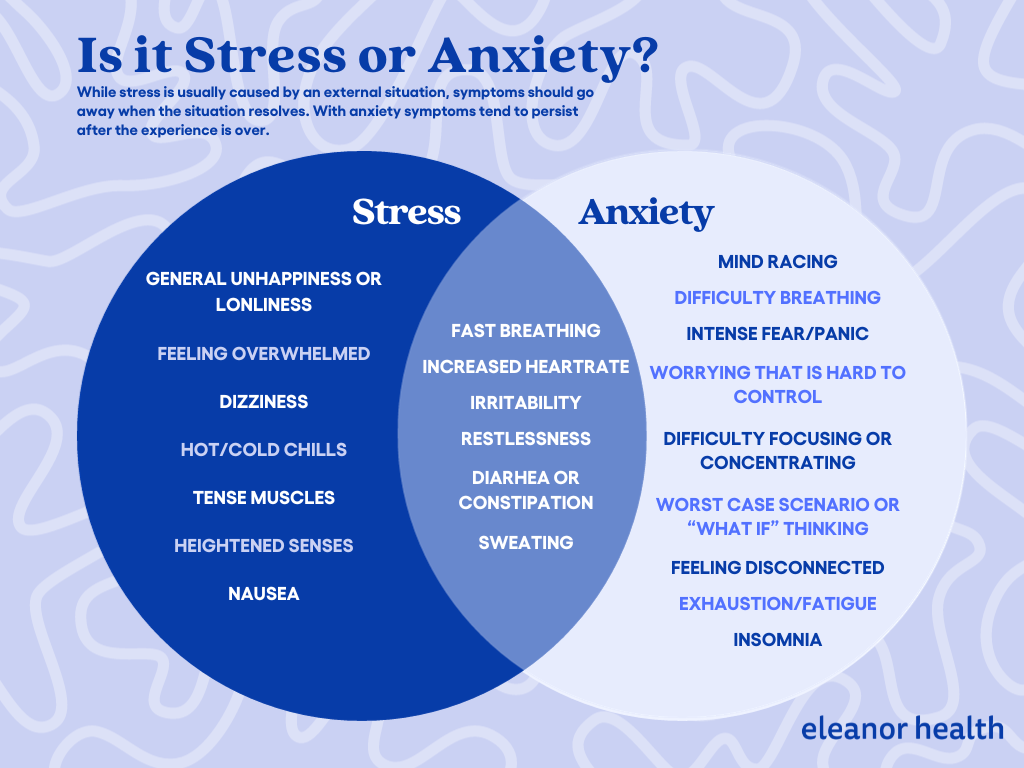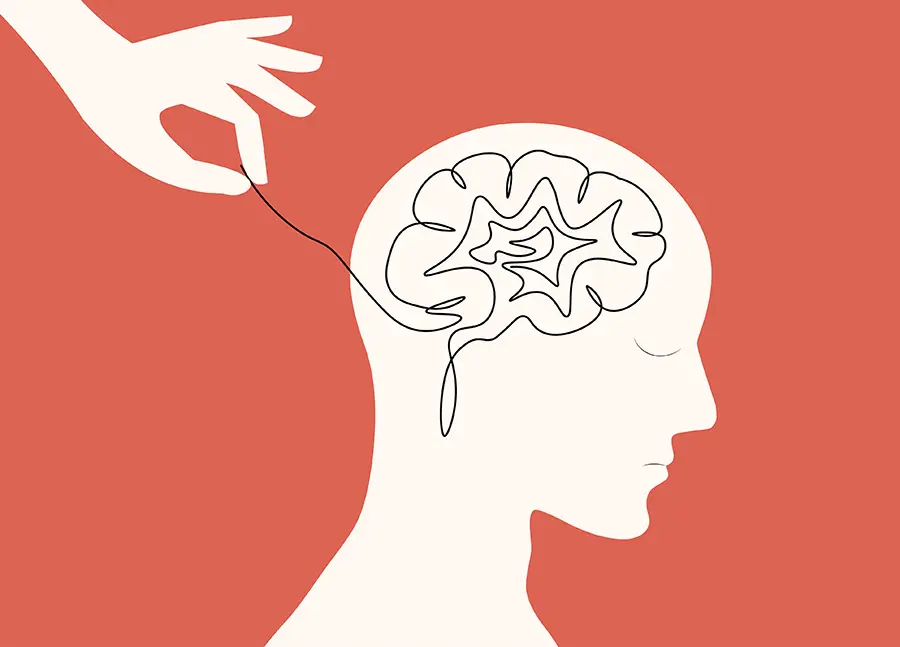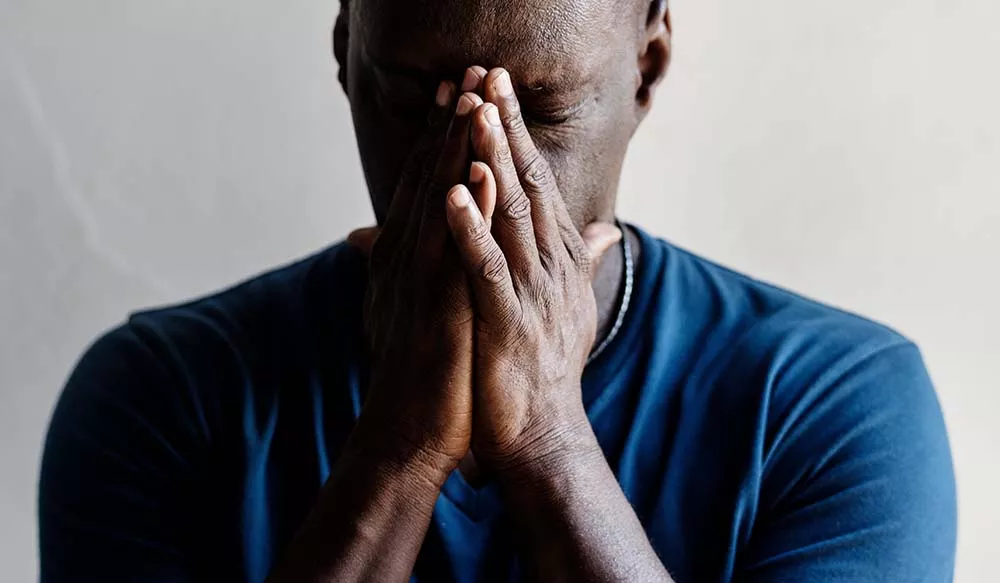Stress and anxiety are a regular part of life for many people. It can be hard to distinguish the difference between the two as they can present the same way. Stress and anxiety are evolutionary responses that motivate us to stay alert, focused, and ready to deal with a potential threat.
However, they can also become harmful over a period of time. Stress can become chronic leading to a multitude of physical and mental health issues; anxiety can become persistent and overactive even without a stressor. Understanding the subtle differences between stress and anxiety is crucial for effective management. Take our quiz to help you identify whether you might be experiencing either stress or anxiety.
Note: This quiz is NOT a diagnostic tool. Mental health disorders can only be diagnosed by qualified mental health professionals.
Stress is a normal response that the body has to some type of change, demand, or threat that can cause overwhelming feelings. Stress can trigger the fight or flight response, which can lead to a variety of physical responses such as dizziness, nausea and a fast heart rate in addition to mood changes and anxiety.
Everyone experiences stress to some degree in their lives; however, each person reacts differently to stress and more extreme stressors can lead to worsened responses. Some people are genetically more resilient than others and can continue to function while managing symptoms. Others with less resilience struggle with a functional response, which can lead to even more stressors. Stress can be both good and bad, as some degree of stress can help motivate you to focus on completing necessary activities. However, negative stressors can be extreme and even traumatizing, which can lead to chronic uncontrolled stress responses, as seen in PTSD. Additionally, long-term stress can make changes in your brain and body that increase your risk for mental health disorders, heart disease, high blood pressure, diabetes, autoimmune disorders, obesity, high choslesterol and arthritis.
Anxiety can share many similar symptoms to stress as it is usually the emotional response that occurs when a stressor comes up. It is often characterized by worry and dread in addition to physical symptoms such as restlessness, muscle tension, and sweating. Both anxiety and stress can upset your stomach, increase heart rate and affect breathing, however anxiety can become persistent even when there are no stressors are present.
When anxiety lasts long enough and starts affecting quality of life, it can become an anxiety disorder. The National Institute of Mental Health estimates that 31% of Americans will experience an anxiety disorder at some point during their lifetime. Anxiety disorders are essentially a secondary stress response that occurs when the stress, fear, or uncertainty one experiences lingers and outlasts the situation causing stress. It can also be caused by the thought of a potential stressor or the fear of a past stressor repeating itself. Anxiety can be severe enough that it impairs focus, which can lead to work or school issues. It can increase irritability and lead to self-isolation. Some can’t even work or maintain personal relationships because their anxiety can be so difficult to manage.
So, how exactly will you know if the symptoms you are experiencing are from stress or anxiety? There are a few ways to differentiate between the two. Stress is usually caused by an external situation, while anxiety tends to be an internal experience that can be unrelated to a stressful experience. Additionally, once the external situation has been managed or at least is no longer of great concern, symptoms of stress should resolve. However, symptoms of anxiety can persist.
Since anxiety and stress are closely related, we will outline specific symptoms and triggers that can help differentiate between the two.
Stress is a common experience many people deal with on after a concerning situation arises. Common symptoms people experience when they are stressed include:
Anxiety can cause a range of long-lasting symptoms that vary from person to person. They can occur when a stressful experience develops, or can come up even without a recognizable trigger. Some common symptoms include the following:

Everyone experiences stress differently and has different triggers. Some of the most common stress triggers include:
Similar to how there is an overlap in the symptoms stress and anxiety cause, they can also have similar triggers. In fact, anxiety disorders can often develop as a result of exposure to repeated stressors. While many of the stress triggers above can result in anxiety, additional anxiety triggers include:
Yes, sometimes stress can develop into anxiety, and it can also worsen existing anxiety. This is because anxiety can be thought of as the body’s reaction to stress, and it is often the result of a chronic stress response that is easier to activate than deactivate. However, this does not mean that everyone who experiences high levels of stress will develop anxiety. Many people experience chronic stress without ever developing an anxiety disorder. There are risks which can increase the likelihood of developing an anxiety disorder including severity of the stressors, history of trauma, genetic risks, physical health issues, other mental health struggles, medication side effects and caffeine/alcohol/substance use.
Since stress and anxiety are similar in their triggers and symptoms, the same coping skills and strategies are often helpful for managing both, although anxiety may require extra assistance if it persists. Knowing the right strategies can then go a long way in helping you manage your symptoms.
Of course, everyone experiences stress and anxiety differently, so you may have to try a few different coping strategies to find one that works best for you. Here is a look at a few tips to help you manage your stress and anxiety symptoms.
There is a strong connection between physical and mental health. Taking care to maintain a healthy lifestyle by eating balanced meals, exercising regularly, and getting an appropriate amount of sleep for your age can go a long way in helping improve your mental health.
While it can be difficult to push yourself to exercise, it is one of the best ways to reduce symptoms of stress and anxiety and exercising thirty minutes 3-5 days a week can vastly improve your well-being.
Try to eat healthy foods or notice what foods make you feel worse; for some with unexplained persistent anxiety, keeping a food diary can help identify possible triggering foods. Try to avoid alcohol and using substances, which may seem to reduce anxiety and stress in the moment but often worsen it in the long run. Additionally, limiting caffeine can reduce anxiety symptoms and the risk for insomnia, which can be an stress/anxiety-inducing experience for many.
The best way to improve sleep is to use CBT-i, or cognitive behavioral therapy for insomnia, which you can complete with a trained therapist or even via app. Additionally, improving sleep habits or sleep hygiene, can improve your sleep. Examples of these lifestyle changes include consistent bedtimes with bedtime routines, avoiding stimulating activities like watching tv, looking at your phone, or exercising right before bed, and avoiding daytime naps.
Mindfulness is a form of awareness of yourself, your thoughts and your surroundings that can help you gain control over your worry and stay in the present. Meditation is an evidence-based way to practice mindfulness and reduce symptoms of anxiety. Meditation can come in many forms, including practicing breathwork and grounding exercises, and it may take time to find the right one that helps you relax. Guided meditations are available online and via apps which make meditation and mindfulness easy to access and try out. Studies show meditation is predicted to reduce the severity of stress and anxiety symptoms by 20%, which is pretty substantial.
A big cause of stress and anxiety for many people is feeling overwhelmed by their daily schedule. One way to help manage your symptoms would be to go through your to-do list and set manageable goals for what you can realistically achieve each day. Setting manageable goals can go a long way in helping reducing overall stress and anxiety levels because it helps tackle stressors in small increments, which are easier to manage and complete.
If you have been struggling with severe stress and anxiety that has been getting in the way of your personal/professional life, you should consider seeking professional treatment. A mental health provider can help assess your condition and provide you with treatment options to help you better manage your symptoms. A combination of lifestyle changes, talk therapy, and medications can help you prevent your stress and anxiety from controlling your life. Feel free to contact us to learn more about your mental health treatment options and the importance of getting professional help.
 How to Treat Anxiety (Without Medication)
How to Treat Anxiety (Without Medication)
 5 Tips for Stress Management
5 Tips for Stress Management
 The Link Between Anxiety and Alcohol
The Link Between Anxiety and Alcohol